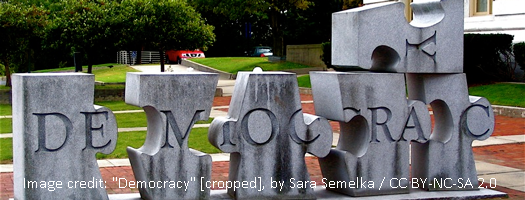Why Universal and Life-Long Higher Education is the Next Step in Advancing the Social Contract
Patrick Blessinger
St. John’s University (NYC) and International HETL Association
Nearly a century after John Dewey published the landmark book Democracy and Education, the principles of learning he espoused for democratic societies are applicable to higher education. He saw education as the primary vehicle through which democracies develop socially responsible citizens, equipped with the knowledge, skills, and values to become full participants in the economy and democratic social order. By now it is clear that, in an increasingly complex and risk-filled world, all citizens require increasingly prolonged periods of learning beyond basic schooling. Higher education for all becomes a gateway to lifetimes of learning.
The Rapid Transformation of Higher Education
For most of its 800 year history, higher education has progressed at an evolutionary pace, but changes have come at a faster pace in the past generation – not only in the United States but around the world. According to the Organization for Economic Development and Cooperation, the total number of students enrolled in higher education worldwide grew from 28 million in 1970 to 165 million in 2009 – and has been projected to reach 262 million by 2025. In the United States, meanwhile, higher education is in the midst of a veritable revolution, now serving as the main vehicle for lifelong learning.
The expansion and transformation of higher education has been shaped from both the top down and bottom up, with government, communities, and businesses all serving as drivers of change:
- Top-down political reforms include the enactment of the Morrill Act of 1862 and the G.I. Bill of 1944 in the United States, and the Further and Higher Education Act of 1992 in the United Kingdom.
- Community-based social movements drove, for instance, the spread of community and technical colleges in the United States.
- Amidst growing pressures for much of higher education to become financially self-sustaining, entrepreneurs and technological innovators have launched new business models such as proprietary colleges and new access and delivery methods such as open universities and massive open online courses (nicknamed “MOOCs”).
Democratizing Forces
Recent reforms and entrepreneurial efforts may be viewed as part of the wider movement to democratize higher education and make it more socially flexible. There are by now many ways to enter higher education – not just by enrolling in a four-year residential college, but via continuing education, vocational-technical colleges, and community colleges; and there are more ways to deliver higher education – including online, distance, virtual, and other electronic means. There are multiple ways to finance higher education – through loans, grants, scholarships, fellowships, and work-study programs. There are ever-more enhancements to higher education – such as study-abroad, cooperative learning, service-learning, and internships – and more ways to build ties across colleges and universities – such as inter-institutional partnerships, student and faculty exchange programs, and credit-transfer agreements.
Driving many of these changes is the hope – and need – to expand citizen access to higher education as the next big step in enlarging the democratic social contract. As a leader in world affairs, the United States is the focal point for many such hopes and efforts. And of course needs for expanded higher education are driven by the reality that entry into most professional careers in medicine, law, education, accounting, science, engineering, and beyond is now not possible without several years of advanced higher education. Beyond that, ever more companies are requiring certification or other evidence of post-secondary education for access into many vocational fields ranging from cosmetology to culinary arts. Policymakers, employers, and civic leaders alike tout the benefits of post-secondary education for virtually everyone.
The Challenge of Cost-Effective Higher Education for All
Opening up higher education to all citizens may seem a natural development in the 21st century, but we must not minimize the challenges that must be addressed. In the United States, a prime challenge is the skyrocketing cost of higher education and corresponding increase in student debt. Total U.S. student debt has surpassed one trillion dollars, and according to the U.S. Department of Education, the average total cost of obtaining a bachelor’s degree, including tuition, books, room and board, and other expenses has now climbed to about $100,000.
To be sure, low-cost or zero-cost higher educational options have emerged in parallel with rising costs and indebtedness, yet it is still uncertain whether innovations such as online courses or the University of the People will make higher education truly more accessible and affordable. Yet as a democratic society, the United States needs to ask about the fairness and sustainability of the current system that excludes so many and leaves many graduates making large monthly loan payments on big college debts, shrinking incomes otherwise spent on other goods or services.
Policymakers and educational leaders need to devise more innovative ways to broaden access while lowering costs. If the demand for higher education continues to greatly exceed supply, the current, unsustainable price and cost structure will remain in place. Some have called for taxpayer support for the first two years of college for all students who can maintain good records, but that step alone is unlikely to be enough. Additional – or alternative – steps would increase student choice and the provision of alternative higher educational services. Examples might include unbundling educational services, so that students only pay for what they are receiving. In addition, increased efforts could be made to facilitate the portability of course credits across institutions. And online course offerings could be expanded and structured so that they lead to accredited, high quality degrees recognized by the job market.
Whatever combination of steps the United States and other countries take to universalize higher education, the goal is more likely to be achieved when our vision of advanced learning is grounded in an ethos of political, social, and economic justice for all.
Note: this article also appears in the Scholars Strategy Network blog at http://www.scholarsstrategynetwork.org/content/why-universal-and-life-long-higher-education-next-step-advancing-social-contract
Suggested Citation:
Blessinger, P. (2015). Why Universal and Life-Long Higher Education is the Next Step in Advancing the Social Contract. Higher Education Tomorrow, Volume 2, Article 2, https://www.patrickblessinger.com/why-universal-and-life-long-higher-education-is-the-next-step-in-advancing-the-social-contract/
Or
Blessinger, P. (2015). Why Universal and Life-Long Higher Education is the Next Step in Advancing the Social Contract. Scholars Strategy Network, http://www.scholarsstrategynetwork.org/content/why-universal-and-life-long-higher-education-next-step-advancing-social-contract
Copyright © [2015] Patrick Blessinger
Disclaimer
Opinions expressed in this article are those of the author, and as such, do not necessarily represent the position(s) of other professionals or any institution.




